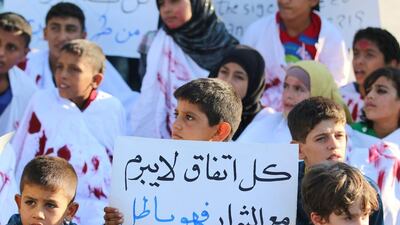ALEPPO // The guns are silent, the killing has stopped but there was still no relief for tens of thousands of desperate Syrians on Wednesday. Despite a significant drop in violence since the agreed ceasefire took effect, aid convoys remained stuck far from where they needed to be.
Just hours before the first of the rolling, 48-hour ceasefires was due to run out at sunset, Russia, which brokered the truce with the United States, called for it to be extended for another two days.
Meanwhile, 20 lorries loaded with a month’s worth of food for 40,000 people in Aleppo were left waiting at the Turkish border, still unable to enter Syria.
The US-Russian deal is part of the latest bid to end fighting between forces loyal to President Bashar al-Assad and a wide range of rebels but excludes ISIL and other extremist groups. The agreement calls for the truce to be renewed every 48 hours. If the ceasefire holds for a week, Washington and Moscow will work together to strike at extremist forces such as ISIL and the former Al Qaeda affiliated Jabhat Fatah Al Sham.
Staffan de Mistura, the UN’s Syria envoy, on Tuesday hailed the truce for bringing about “a significant drop in violence” despite isolated skirmishes.
The Syrian Observatory for Human Rights, a UK-based monitor of the war, said it had recorded no deaths in the country since the truce took effect. “It is very positive,” said director Rami Abdel Rahman. “If things continue on this path it will be a positive development in protecting Syrian civilians from killing, fighting and displacement.”
Then, hours before the expiry of the first ceasefire, Russia demanded the extension. And for the 250,000 trapped under siege in eastern Aleppo, the truce — while they welcomed it — has yet to make their lives easier.
“The situation is still bad as the markets are empty,” said Abu Jamil, 55, who lives in the rebel-held east of the city. “The truce is good, but it’s not enough. We want food to come in.”
The UN’s Office for the Coordination of Humanitarian Affairs in Gaziantep, a Turkish town on the Turkey-Syria border, said the 20 aid lorries were stuck on the border because of security concerns.
“The main issue at this point is ensuring all parties to the conflict are on the same page ... This is a very complex environment and we need security guarantees,” said OCHA spokesman David Swanson. “Based on what we’re hearing from the ground, it’s not likely to happen today.”
One Syrian security source said the hold-up was due to regime forces not yet withdrawing from Castello Road, a the key road which runs to the Turkish border.
However, a pair of lorries from Turkey managed to deliver food and children’s toys to the northern Syrian town of Jarabulus, the border town liberated two weeks by the Turkish army in a blitzkrieg offensive.
The aid, comprising 25 tons of flour, rice and pasta organised by the youth wing of Turkey’s ruling AKP party arrived on Wednesday, the third day of the Muslim Eid al-Adha holiday. Turkey’s state-run Anadolu news agency said the Turkish Red Crescent had distributed meat from animals sacrificed for Eid al-Adha to 4,500 households in Jarabulus.
Russia said it had recorded 60 rebel violations of the ceasefire, while the opposition said they had recorded 28 serious violations by government troops on Tuesday.
Initially, the deal forged by US secretary of state John Kerry and Russian foreign minister Sergei Lavrov, allows the Syrian air force to continue strikes in areas where ISIL or Jabhat Fatah Al Sham (formerly known as Al Nusra Front) are present. Once the joint Russian-US targeting begins, however, government warplanes “will no longer be able to fly in any areas of Syria where there is opposition or Al-Nusra Front presence,” a senior US administration official said.
But there remains deep scepticism about whether the truce will hold, with the opposition not yet fully committed.
A crucial part of the deal calls on non-extremist rebels to break ranks with Jabhat Fatah Al Sham ahead of joint US-Russian operations against the group.
But many Islamist rebel groups cooperate closely with Fateh Al-Sham, and the biggest of them — the powerful Ahrar Al-Sham group — has criticised the terms of the Russian-US deal.
If the deal does hold, it could open the door to new peace talks to resolve the conflict, with Russia saying Mr De Mistura could invite government and opposition representatives to new talks “at the very beginning of October”.
* Agence France-Presse
* Associated Press

